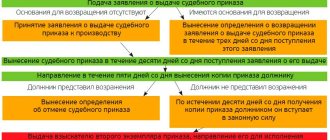If one of the parents evades participation in the material support of their child (children), the other parent has the right to legally force him to make payments in favor of the child - assignment of alimony. This right is approved by clause 2 of Art. 80 of the Family Code (FC) of the Russian Federation, and it does not matter whether the mother and father are legally married or divorced, live together in the same territory or separately - payments will be ordered by the court if one of the parents is financially indifferent to the upbringing of the child.
Forced collection of alimony is possible only by going to court in one of the following ways:
- In a simplified manner - filing an application for a court order for alimony in accordance with Art. 122 of the Civil Procedure Code (Civil Procedure Code) of the Russian Federation without scheduling a hearing on the case.
- In a full-fledged claim procedure - filing a statement of claim to establish alimony, implying a full consideration of the case with meetings and hearing the arguments of the parties.
The advantages of collecting alimony through a court order are the speed of assigning funds and the absence of court hearings, however, not all collectors can afford this procedural method of assigning funds to a child.
If the defendant is already burdened with alimony obligations for other children, or is an unemployed person, alimony will have to be recovered from him through a full-fledged lawsuit.
Moreover, the defendant has the right to cancel the court order within ten days from the date of its issuance in a simplified manner by sending the court his objection to the order. In this case, the order will be canceled, and the claimant will be explained the right to claim alimony - i.e. re-applying to court.
What is a court order?
The concept of a court order is disclosed in Article 121 of the Code of Civil Procedure of the Russian Federation. In our case, a court order will be a court decision made by a single judge on the basis of an application for the collection of alimony.
The claimant submits an application to the magistrate, in which he demands to collect alimony from the debtor and supports his demands with the necessary documents. In turn, the magistrate issues a court order on the merits of the stated claim.
It is worth noting the fact that a court order is also an executive document. That is, we receive a court order and give it to the bailiffs for execution. A writ of execution is not issued.
In what cases will an order be refused?
The most common reason for refusing to issue a court order is a violation of the requirements of Article 122 of the Code of Civil Procedure of the Russian Federation.
The magistrate returns the application for the collection of alimony if:
- paternity of the child has not been officially established;
- a request for deductions in the form of a fixed amount of money has been declared;
- the debtor is already paying funds to support another child (or other dependent).
In such cases, the applicant is explained the right to file a claim in a district (city) court of general jurisdiction.
Another common reason for the return of an application is the lack of documents confirming the requirements. Also, the application for an order will be refused if the applicant asks to recover funds for the past period.
In what form is it possible to collect alimony?
In general, in the absence of an agreement on the payment of alimony, alimony can be recovered in court:
- In shares of earnings (Part 1 of Article 81 of the RF IC).
- In a fixed amount of money (Part 1 of Article 83 of the RF IC).
- Simultaneously in shares and in a fixed sum of money (Part 1 of Article 83 of the RF IC).
The amount of alimony in shares of earnings collected in court for minor children from their parents is established by the Family Code and is: for one child - one quarter, for two children - one third, for three or more children - half of earnings and (or) other income of parents monthly.
Collection of alimony in a fixed sum of money is possible, for example, if the debtor has irregular earnings or income, or earnings or income in foreign currency, or if there is no official income at all. The same applies to the possibility of collecting alimony both in shares and in a fixed sum of money.
I will write in more detail about the second and third methods in another article, since this article is about a court order. And with the help of a court order, alimony can only be collected in shares of earnings.
How is alimony collected by court order without a writ of execution?
For the order to take effect, you must submit it to the territorial department of bailiffs with the appropriate application. In a written request you must indicate:
- personal passport details and telephone number; details of the claimant;
- number, judicial institution and date of issue of the order;
- amount of recovery;
- all available information about the person from whom alimony must be withheld;
- details of the creditor's current account.
Note! If the amount of debt does not exceed 25,000 rubles, then in accordance with Part 1 of Art. 9 of Law No. 229-FZ “On Enforcement Proceedings” dated October 2, 2007, the order can be addressed to the organization where the debtor receives wages, pensions, stipends and other periodic payments.
Therefore, if the claimant knows the defendant’s place of work, then the order can be submitted to the accounting department of this organization independently. In this case, you also need to write a statement.
In what cases is it necessary to apply for a court order?
In order to determine whether you have the opportunity to apply for a court order, it is necessary to clarify certain circumstances, since the law establishes conditions under which a court order cannot be issued.
It is important to understand here that, under certain circumstances, you cannot simply go straight to the district court with a claim for alimony, without going to the magistrate for a court order. In this case, they will simply return the statement of claim to you and explain that the stated claims are subject to consideration in the order of writ proceedings.
The same will happen if you turn to the magistrate for a court order with demands for the collection of alimony, subject to consideration through the claim proceedings.
There’s nothing wrong with that, of course, but you’ll be wasting your time. And if the child is in dire need of child support, wasted time can be critical.
Now let's deal with this issue. Below I will list the conditions, if they coincide, you need to contact the magistrate for a court order to collect alimony:
- The claimant applies for the collection of alimony from the date of filing this application, and not for the past period, and only in shares of earnings in accordance with Part 1 of Art. 81 IC RF.
- The debtor does not pay court-ordered alimony to other persons.
- The paternity of the debtor has been established.
Simply put, for example, you are raising one child and want to recover from the other parent ¼ of earnings and other income monthly, starting from the date of filing your application with the magistrate. At the same time, the parent obligated to pay child support is included in your child’s birth certificate, and is not currently paying court-ordered child support for other persons, for example, for a child from another marriage. If the above conditions are met, you have a direct path to obtain a court order from a magistrate.
Accordingly, in all other situations, you should file a claim in the district (city) court, where a completely different procedure awaits you than in writ proceedings.
In other words, if you believe that it is necessary to collect alimony from the debtor in a fixed sum of money, or both in shares and a fixed sum of money, or the debtor is already paying alimony by court decision to other persons, or there is a dispute about paternity (maternity), - judicial In this case, you will not be able to receive an order. Or rather, under a certain set of circumstances, it is possible and will work out, since anything can happen in our courts. But that’s not what my article is about.
It is also possible that you approached the debtor with a demand for payment of alimony before going to court, but the debtor refused or simply ignored your demands. For example, for one year before going to court, you sent the debtor telegrams, registered letters with notification or by e-mail, with a demand for payment of alimony or with a proposal to conclude an agreement on the payment of alimony. However, they were refused or received no response at all.
In this case, you have the right, when going to court, to demand the recovery of alimony not from the moment you went to court, but for the past year in which you applied to the debtor (paragraph two of paragraph 2 of Article 107 of the RF CK). And in this situation, you will also not be able to obtain a court order, since such claims can only be considered through litigation. Alimony can be recovered by a court order only from the date of filing the application for the court order.
I think everything is clear here? If not, ask questions in the comments, I’ll try to answer. Now let's move on to the next question.
What it is?
A child support order is a document issued by a judge as a result of a simplified procedure for collecting child support payments.
The structure of a court order consists of two parts:
- water;
- resolutive.
Legally, the document is equivalent to a writ of execution, which means its immediate execution by authorized persons is mandatory.
Contents of a child support order:
- Name of the territorial judicial authority, court address;
- Full name of the judge authorized by law to consider the case of collecting alimony payments from the parent at the request of the plaintiff;
- Information about the applicant and payer: full name according to the passport;
- when and where were you born?
- other important information specified in the passport;
- the name of the company where the parent is employed and the position he holds;
- full name, surname, patronymic;
- amount, method of deduction from earnings (as a percentage or in a fixed amount);
According to Article 122 of the Civil Code of the Russian Federation , the simplified procedure for collecting alimony also means the absence of hearings and court hearings in the case. The magistrate alone, without the need to call the parties, makes a decision on the collection of alimony.
After the decision is made and the court order is drawn up, copies of the document are sent to the participants in the process: the plaintiff (applicant) and the defendant (child support parent).
The applicant may express his desire and request to forward the court order to the bailiff service at the defendant’s place of residence, independently. Otherwise, the plaintiff will have to notify this authorized body independently and initiate enforcement proceedings.
The validity period of a court order for the collection of alimony is not limited. If a child support parent, even after a court order has been issued, evades payment, the court may recover funds for the entire period of evasion, even if the period exceeds 3 years. Alimony is awarded from the day the plaintiff submits an application to the court.
If, for a number of reasons, the father did not pay child support according to a court order, and the parent in whose care the child was, did not collect it, then the child, upon reaching the age of majority, has the right to do this independently.
The defendant, having received a copy of the court order, has a period of 10 days to file an objection to the court order. Having missed this deadline, he will have to transfer money to the child monthly for maintenance.
Which court should I apply for a court order?
An attentive reader will now easily answer this question, since earlier in the article I have repeatedly mentioned that an application for a court order to collect alimony for a minor child must be submitted to a magistrate. How can I find it? Let's figure it out now.
Part 1 of Article 123 of the Code of Civil Procedure of the Russian Federation tells us that an application for a court order is submitted to the court according to the general rules of jurisdiction established by Chapter 3 of the same Code of Civil Procedure of the Russian Federation. In Chapter 3 we find part 1 of Article 23 and learn that the magistrate considers cases of issuing a court order as a court of first instance. According to the general rules, a claim is filed in court at the place of residence of the defendant (Article 28 of the Code of Civil Procedure of the Russian Federation). Next, we find part 3 of Article 29 of our beloved Code of Civil Procedure, and we see that claims for the collection of alimony and for establishing paternity can also be brought by the plaintiff to the court at the place of his residence.
So, as you may have already guessed, an application for a court order can be submitted to a magistrate, both at the place of residence of the debtor and at the place of residence of the claimant. That is, wherever it is more convenient for you, you serve it there. The place of residence is the place of registration according to the passport (according to the old “propiska”). Don't know the location of the debtor? And you don’t need it. Calmly submit to the place of your registration and all matters.
I think it won’t be too difficult for you to find a justice of the peace at your place of residence. As a rule, they are all divided into sections, for example, “Judicial section No. 1 of the Central Judicial District of the city of Novokuznetsk.” You need to find out which court district you are assigned to. How to find out? You can find the website of the court district on the Internet and look in the “territorial jurisdiction” section. Find your street and house number there. Or you can call the court, or go in person. There is usually an information stand with all the necessary information.
This is exactly what you will apply to your site after you read this article to the end and prepare all the documents and copies. During office hours, you will need to bring a package of documents to the office and give it to the secretary of the magistrate of the court district. If you do everything correctly, the secretary will accept the documents, register the application and put a stamp on the second copy of the application, which confirms acceptance of the application. The second copy with the secretary's mark will remain with you.
Court rulings
There are different types of court decisions.
They indicate certain obligations that must be strictly fulfilled by all participants in the process. Moreover, the structure of such papers is heterogeneous and differs in content in each specific case based on the actual circumstances.
In judicial practice, there are several types of rulings:
- The decision is made upon completion of the consideration of the claim with the participation of all citizens involved in the case in the courts of first instance. The text sets out the final conclusion reached by the assessors. It also indicates on the basis of what legal provisions it was made.
- The court makes a ruling in order to resolve minor issues identified during the study of the circumstances of the case. Even several of them may be announced for one production. For example, about ordering an examination, about requesting documents when new circumstances are identified, etc.
- The order is issued by the judge to recover funds or property from the debtor in favor of the applicant. Such a document is issued without involving participants in the meetings. This type of ruling is made exclusively in the case of writ proceedings conducted in accordance with Chapter. 11 Code of Civil Procedure of the Russian Federation. The text indicates the implementation of forced withholding of part of the debtor's income in favor of the creditor.
Now let us consider in more detail what effect an order has on the issue of collecting alimony, as opposed to a decision.
Do I need to pay a state fee for issuing a court order?
No no need. Of course, if we are talking about collecting alimony. The legislator has provided for the exemption of plaintiffs in claims for the collection of alimony from payment of state duty. This benefit is established by subparagraph 2 of paragraph 1 of Article 333.36. Tax Code of the Russian Federation. However, no one exempted the defendants from paying state duty. Therefore, when issuing a court order, the magistrate will kindly collect 150 of our domestic rubles from the debtor (alimony payer) (clause 14, clause 1, article 333.19 of the Tax Code of the Russian Federation).
Consideration of the case in the order of writ proceedings
Step 1.: Preparation and submission of documents to the court.
Step 2: Consideration of the application by the court.
The judge can: accept the application and issue a court order within 5 days; return documents; refuse to accept the application, about which a decision is made within 3 days.
Step 3.: Immediately after the court order is issued, it can be received and presented for execution at the debtor’s place of work or to the bailiff service.
Step 4: The judge sends a copy of the court order to the debtor, who has the right to submit objections regarding its execution within 10 days from the date of receipt of the order. Objections may not contain specific reasons, the main thing is the fact that the debtor disagrees with the court order.
Step 5.: After 10 days from the date of receipt of the order by the debtor:
it comes into force (if no objections are submitted) or the judge cancels the court order, makes a ruling and sends it to the parties within 3 days.
Step 6.: If the court order is canceled by the debtor, a claim for the collection of alimony should be filed, which will be considered with a summons of the parties and a hearing on the case. In this case, alimony can be claimed from the date the original application for the order was filed, rather than from the date the lawsuit was filed.
Application for a court order to collect alimony
Now it’s time to find out how to correctly draw up an application for a court order for alimony. Although, in truth, I have already compiled it for you. All you need is an application for alimony, and edit it to suit you. That is, enter the desired magistrate, full name, date of birth, address - yours, the debtor and the child (children). Next, print and sign the application in two copies. Prepare the necessary documents and make copies of them. That's all. Although no, not everything. You will also need to collect all this in a pile and take it to the magistrate. I suggest doing this right now. Just do it!
What documents are attached to the application?
Nothing special here. In most cases, it is sufficient to submit the following documents along with the application:
- Certificate of marriage or divorce.
- Birth certificate of the child(ren).
- Certificate of residence.
- Copies of all attached documents.
This list is not exhaustive and may vary depending on your specific situation. For example, if after the divorce you did not receive a divorce certificate, then you can submit a court decision on divorce. If you are applying for alimony during marriage, then you must provide a marriage certificate. A certificate from the place of residence will confirm the fact that the child is registered with you.
Pros and cons of a court order
The main advantages of obtaining a court order for the collection of alimony are the simplicity of the procedure itself and the timing of receiving the order. Unlike claim proceedings, in writ proceedings there is absolutely no need to come to court hearings. The court order is issued within five days from the date your application is received by the court. Then, within five days, a copy of the court order is sent to the debtor, and if within 10 days the debtor has not received any objections to the court order, the judge issues to the claimant a second copy of the court order, certified by the official seal of the court, to present it for execution. As a result, approximately 20-25 days from the date of going to court, you can receive a court order and present it to the bailiffs. In a lawsuit, believe me, it won’t work out that quickly.
However, there is one big disadvantage, the content of which is disclosed in Article 129 of the Code of Civil Procedure of the Russian Federation. The point is that if the debtor’s objections regarding the execution of the court order are received within the prescribed period, the judge cancels the court order. Moreover, in these very objections there is no need to substantiate anything, refer to any law, or the like. It will be enough for the debtor to simply write that he does not agree with the court order, and he does not have to pay anything to anyone. Based on these objections, the court order will be set aside. And the claimant will have to go to court again, only with a statement of claim.
Features of a child support order
A court order is a document solely adopted by the court establishing monthly monetary alimony in favor of a minor child in need.
The obvious procedural advantages of this method of assigning funds are:
- speed of establishing alimony payments (according to Article 126 of the Code of Civil Procedure of the Russian Federation, the period for the court to issue an order is 5 days);
- absence of court hearings in the case (i.e. neither the applicant nor the defendant are invited to court).
However, the court order also contains many “disadvantages”:
- it is impossible to resort to this method of collecting alimony if the defendant has other alimony obligations , as well as if the latter does not have a permanent income in the form of wages, pensions, etc.;
- funds can be assigned only in shares of income in accordance with Art. 81 of the RF IC, and the possibility of establishing alimony in a fixed amount is excluded;
- if the defendant receives an objection to the court order , it will be canceled by the court also without scheduling a hearing on the case, and the alimony collector will have to apply to the court again with the same claims in the manner of a full-fledged lawsuit.




